Contents
In Focus:
Adapting to a pandemic
1.
Field Updates
2.
Policy Updates
3.
Gender-Responsive DDR
4.
Weapons and Ammunition Management
5.
Stories From the Field
6.
IDDRS Updates
7.
Upcoming
Adapting to a Pandemic
The COVID-19 pandemic has highlighted the linkages between peace and security, peacebuilding, social cohesion, and health. Areas affected by conflict and violence are often more vulnerable to the spread of infectious diseases, as has been the case with the resurgence of polio in Syria, outbreaks of cholera in Yemen, and the persistence of Ebola in DRC.
Insecurity, weak governance, lack of infrastructure, and mistrust of state institutions are some of the compounding challenges that make the prevention and treatment of infectious diseases difficult. In turn, lack of support and inequity in response to infectious diseases in conflict areas can further exacerbate communities’ grievances and the root causes of conflict.
The adaptations of DDR and CVR to address the immediate needs of beneficiaries and their communities highlights the potential of leveraging collective action and innovation through a health lens towards positive peace in conflict affected communities.
These CVR projects can provide a template for how interventions within the nexus of peace, development, and humanitarian action can be adapted to respond to emergent crises while continuing to progress towards peace outcomes and a foundation for sustainable development.
Due to disruptions and restrictions imposed during the COVID-19 pandemic, DDR programmes experienced interruptions and delays in mandate implementation. Given the need to avoid losing momentum on fragile peace agreements, with guidance of HQ and through partnerships with WHO and other health institutions, components took the following measures: i) programme criticality analysis to determine operational and strategic priorities; ii) staggering DDR processes focusing on weapons collection at the minimum; iii) stepping up political and good offices functions when operations were not feasible; and iv) ensuring that DDR processes and personnel were not vectors of the disease.
With these mitigation measures in place, DDR-CVR components began to innovate and went above and beyond the parameters of what are considered traditional DDR interventions. Even as the pandemic began to accelerate, components were able to repurpose and retool Community Violence Reduction (CVR) projects to support national government’s response to COVID-19.
In these settings that were affected by both conflict and the pandemic, the use of CVR projects provided a unique type of intervention at the intersection of health and peace. Through these projects ex-combatants and communities alike came together in support of local health systems, the rehabilitation of critical health infrastructure and the production of much needed PPE.
Look back: September COVID-19 Newsletter
Challenges:
Disruptions due to COVID-19 and subsequent restrictions continued to affect mandate implementation on DDR/CVR in all mission settings. DDR programmes experienced delays, and while CVR projects continued to be implemented by MINUSMA, MINUSCA, MONUSCO and UNAMID, they faced significant restrictions. These included virus prevention protocols, restricted freedom of movement of personnel and limited monitoring of projects. In addition, for MONUSCO, which is mandated with DDRRR, travel restrictions between the countries of the Great Lakes region, substantially hampered repatriation and resettlement efforts of demobilized ex-combatants.
Mitigation measures:
Business continuity to the extent possible was a key principle for DDR components in the field. Given the need to avoid losing momentum on fragile peace agreements, with guidance of HQ and through partnerships with WHO and other health institutions, components took the following measures: a) programme criticality analysis to determine operational and strategic priorities; b) staggering DDR processes focusing on weapons collection at the minimum; c) stepping up political and good office functions when operations were not feasible; and d) ensuring that DDR processes and personnel were not vectors of the disease.
Innovation:
DDR-CVR components also repurposed and retooled Community Violence Reduction projects to support national government’s response to COVID-19. In contexts such as CAR and Mali, this has included sensitization and risk communication with conflict-affected communities, as well as the production of personal protective equipment (PPE). The repurposing of CVR has also allowed for the implementation of quick impact projects towards the health response, leveraging the capacities of ex-combatants and community members in building critical health and sanitation infrastructure such as water wells and isolation centers.
Sustainability:
In addition to using COVID-19 as an opportunity to strengthen social cohesion and reduce violence in the short term, another guiding principle of DDR-CVR interventions was to ensure sustainability in the long term. Looking ahead to the end of the pandemic, missions such as MINUSCA (CAR) designed convertible projects from the outset. For example, the COVID-19 screening and isolation centers built during the crisis could be converted to maternity halls to enhance the capacity of local health facilities; maintaining the wells in a post-COVID community could contribute to the reduction of intercommunal conflicts that often emerge due to competition over scares resource; and the health check-points established at the Cameroon border will eventually be turned into border control facilities further strengthening national security capacities.
DRC
The DDR Kananga team responded by conducting several sensitization sessions with local authorities, women, and youth representatives. These sessions promoted peaceful resolution of conflicts while delivering critical messaging about COVID-19 preventative measures such as handwashing.
Sudan
CVR projects in various regions included house-to-house awareness visits, disseminating Ministry of Health protocols and brochures, short presentations, and mobile awareness campaigns. In addition, projects provided training to volunteers from IDP camps and host communities to help sustain key messaging about handwashing and social distancing.
CAR
CVR was used to sensitize local populations on COVID-19 and related sanitary precautions and requirements, deliver sanitation products from outside and launch the production of sanitation equipment and infrastructure locally. CVR beneficiaries also helped to construct and renovate health infrastructure including a screening centre in Kaga Bandoro’s prefectural hospital, a drilling in Bingue, isolation and treatment centres near Bria, and health-control checkpoints at the border. These infrastructure projects have provided much needed support to the government and increased trust and social cohesion within communities.
Mali
The provision of 967 individual and 100 collective hygienic kits to soldiers and ex-combatants in Kidal, Gao, Timbuktu, and Menaka enabled the continuation of DDR processes that were initially suspended due to the pandemic. The kits included much needed WaSH and PPE supplies including soap, hand gels, and buckets.
Field Updates
Central African Republic
In September, MINUSCA reported the end of two major disarmament and demobilization efforts, in Kaga Bandoro (114 combatants, including 9 women) and Bria (307 elements, including 23 women).
On 14 October, the DDR Section (DDRS) facilitated a meeting between MINUSCA DDR and International Organization for Migration (IOM) aimed at strengthening the partnership in the area of DDR, namely in the area of Community Violence Reduction (CVR) where both MINUSCA and IOM are implementing complementary projects.
On 16 October, Disarmament and demobilization operations started in Birao, targeting 629 combatants from the Front populaire pour la renaissance de la Centrafrique (FPRC), Le Mouvement des libérateurs centrafricains pour la justice (MLCJ) and Rassemblement Patriotique pour le Renouveau de la Centrafrique (RPRC). On the first day of operations, a total number of 20 combatants were disarmed and demobilized and 15 weapons of war, including four collective weapons of war, 516 ammunitions and one OG7 rocket were collected.
On 22 October, the 2020-21 CVR Programme in Bangui was ceremonially launched in the Ministry of DDR. This year, the Bangui project targets 600 beneficiaries, including 400 former PK5 self-defense members and 200 community members of the 3rd district, including those participating in the PK5 “good neighborliness agreement”. During the ceremony, 14 former PK5 self-defense groups handed in 14 weapons of war, 1 artisanal weapon, 4 rockets, 13 shells and 104 pieces of ammunition that are now stored in the MINUSCA DDR container.
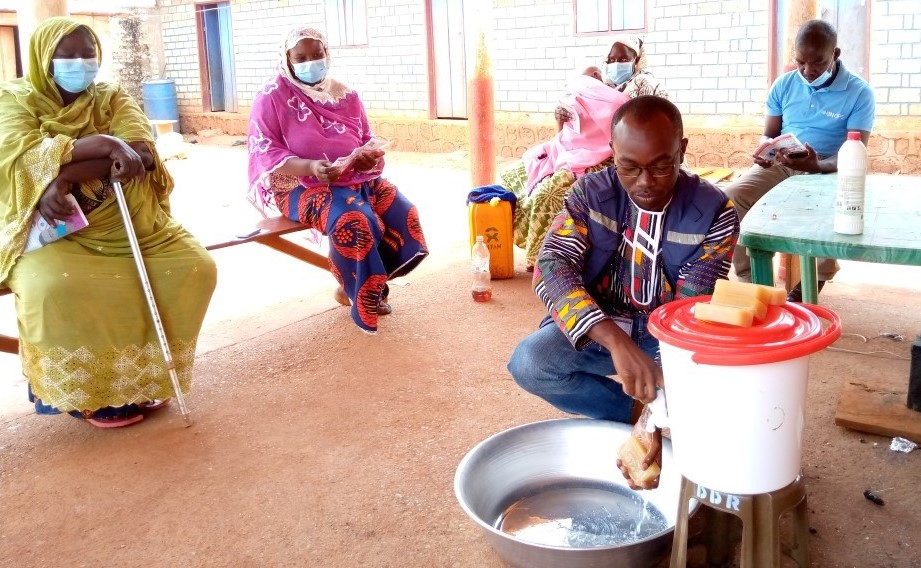
In November, the National DDRR Program Execution Unit mobile team concluded disarmament and demobilization operations in Kaga Bandoro and Birao, with MINUSCA’s support. In Kaga Bandoro, a total of 167 elements including 15 women were disarmed and demobilized and 119 weapons of war were collected. In Birao, 249 elements, including 5 women were disarmed and demobilized and 243 weapons were collected.
On 23 November, the start of DD operations with an initial list of 200 combatants in Bria was expanded with a list of 1600 combatants spread across the center and east sectors of CAR. This additional list was analyzed in order to identify the exact locations and the eligibility of the combatants and to allow for proper planning for a large round of DD operations in the west and east region.
In December, the launch of the 2020-21 CVR Programme in Bangui began with trainings in eight vocational training centers. Based on the choices and socio-economic profiles of the beneficiaries, training was offered in driving, mechanics, tailoring, computers and income generating startups. On the first day of the training, the level of participation stood at 86% and at 95% for the second day.
Libya
On 23 October the Libya Permanent Ceasefire Agreement was signed. The Agreement included language related to commencing the process of separation, cantonment, vetting and registration of all armed groups and entities in Libya.
In November, the DDR Section held a series of meetings with colleagues in UNSMIL to ascertain the next steps – and level of support needed – following the adoption of the Permanent Ceasefire Agreement with clear references to DDR-related actions. As things stand, the main follow up will be political in nature with the constitution of the DDR Sub-Committee. In addition, the DDR Section met with Konrad Adenauer Stiftung (KAS) Office in New York to discuss potential joint engagement in Libya which may involve a lessons-learned exercise from previous attempts at DDR in Libya to inform the current planning process.
Sudan
On 17 December, DDRS, in cooperation with the Conflict Prevention and Peace Forum (CPPF), organized the second CPPF workshop on DDR lessons learned in Sudan. The virtual event was complemented by an in-person gathering in Khartoum. The discussions focused on lessons learned from previous DDR interventions in Sudan and how they can be applied in the current circumstances following the establishment of UNITAMS and the 3 October Juba Peace Agreement. Most notably, the Sudan DDR Commission recognized the importance of CVR initiatives in the Sudan context, and elaborated on a variety of areas for which they seek additional support, e.g. transitional weapons and ammunition management (WAM).
Mali
Despite stalled DDR and Integration processes following the 18 August military coup in Mali, MINUSMA continued to support various CVR initiatives including a water supply project with a community in the Gao region and projects in the Timbuktu area aimed at promoting local youth’s engagement in community work such as gardening and farming activities.
On 5 October, the President of the transition signed a decree indicating the appointment of the members of the new Transition Government. Following the establishment of the Transitional Government, DDR processes remained on hold until key national and international stakeholders could discuss a new calendar for the implementation of the Agreement on Peace and Reconciliation in Mali. Meanwhile, MINUSMA DDR continued to facilitate the implementation of CVR projects in Gao, Kidal, Mopti and Timbuktu regions.
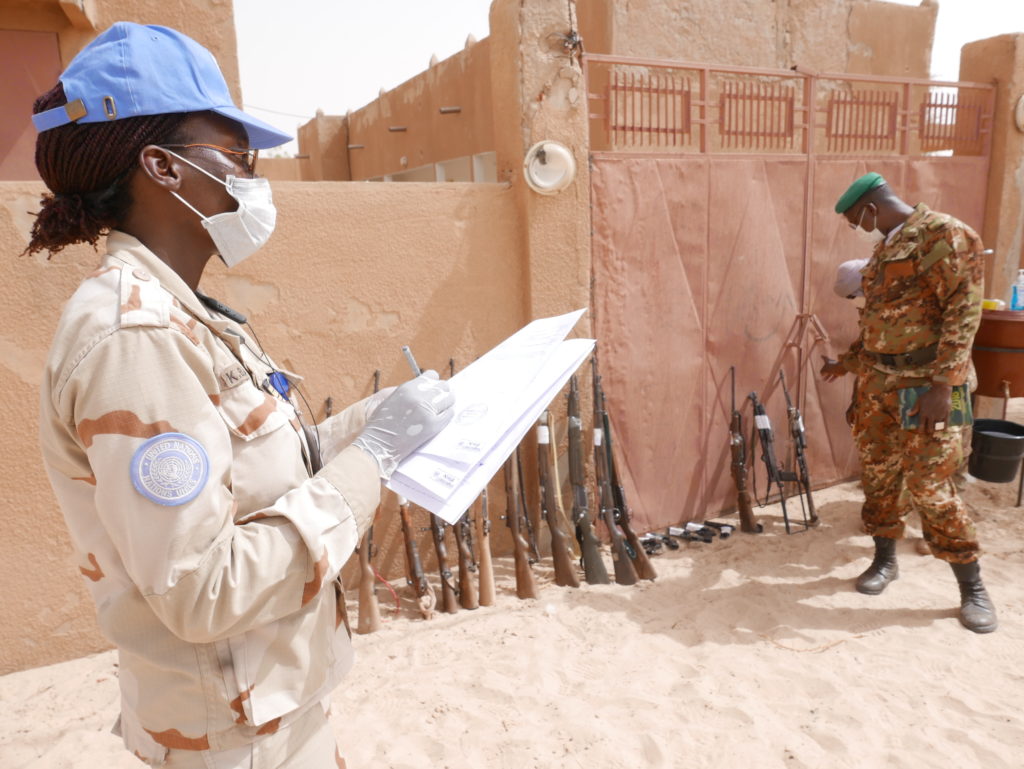
On 28-29 October, seven CVR projects were handed over by the SSR-DDR Section to local communities in the Mopti area. These projects included the provision of equipment to facilitate vocational training, the establishment of solar panels and water towers, the provision of vocational training to approximately 350 community members, including 200 women, and the creation of temporary employment opportunities for approximately 500 youths in the Mopti region. At the same time in Kidal, the SSR-DDR section handed over three CVR projects to the local population and initiated the rehabilitation works of the Mécanisme opérationnel de coordination’s camp.
In November, as a result of the meeting of the Comité de Suivi de l’Accord, discussions began with the National DDR Commission to resume the stalled Accelerated DDR and Integration (ADDR-I) process as well as the transfer of 400 demobilized elements to training centres in the South.
Lake Chad Basin
DDRS continued support the operationalization of the Regional Stabilization Strategy (RSS) for the Boko Haram-affected areas. Through engagement with the Lake Chad Basin Commission (LCBC) Secretariat, DDRS contributed to the development of the RSS Results Framework, particularly on Pilar 3 regarding Disarmament, Demobilization, Rehabilitation, Reinsertion and Reintegration of Persons associated members. The team was actively engaging in coordination mechanisms such as RSS Regional Task’ Protection and Security Cluster, which allowed advocating for the alignment of interventions in accordance with UN Security Council 2349 (2017) as well as decisions and African Union Peace and Security Council and the LCBC Council of Ministers.
Republic of Congo
In September, the DDRS met with the Resident Coordinator, Peace and Development Advisor, and UNDP Resident Representative in RoC (Brazzaville) to discuss potential programmatic entry points for developing CVR projects, including a set of youth-focused interventions in the lead-up to the elections (scheduled for Q2 of 2021). Linked to the currently stalled national DDR programme, the project would aim to prevent remobilization of ex-combatants who are awaiting the programme during the electoral and post electoral period.
On 23 December, the DDRS along with the Central and Southern Africa Division (CSAD) colleagues, met with the Peace and Development Advisor in the Office of the Resident Coordinator of Republic of Congo. As part of the recent decision by the Resident Coordinator to strategically shift its support to the government from DDR to CVR in order to mitigate the risk of remobilization of ex-combatants in the context of the upcoming elections, the DDRS is currently supporting the Office of the Resident Coordinator in developing an operational plan in this regard. To this end, the meeting was an opportunity to onboard a consultant who has recently been hired to undertake the conflict analysis, risk analysis, and stakeholder mapping that will underpin the proposed shift. This conflict analysis, which will include community consultations, will offer programmatic recommendations to the Resident Coordinator and UN Country Team in Q1 2021.
Democratic Republic of Congo
In September, a dialogue workshop organized by national stakeholders and international NGOs for armed groups operating in South Kivu resulted in 70 armed groups signing the final declaration, in which a ceasefire was declared and the Forces armées de la république démocratique du Congo (FARDC) were called to stop their operations against armed groups.
Following setbacks in the stalled disarmament and demobilization process of the Force de résistance patriotique d’Ituri (FRPI), DDRS, the MONUSCO Integrated Operational Team, and various components of MONUSCO met in November to discuss how to concretely facilitate the development of a new national DDR framework, including a community-based reintegration strategy, and the linkages between these national DDR efforts and broader measures needed at the regional level.
In December, the DDRS joined the MONUSCO Integrated Operational Team to consult with the Group of Experts (GoE) of DRC to discuss their midterm report. The GoE briefed on new trends in the DRC including armed group dynamics, natural resource exploitation, obstacles and breakdowns in the FRPI DDR process, and foreign combatants.
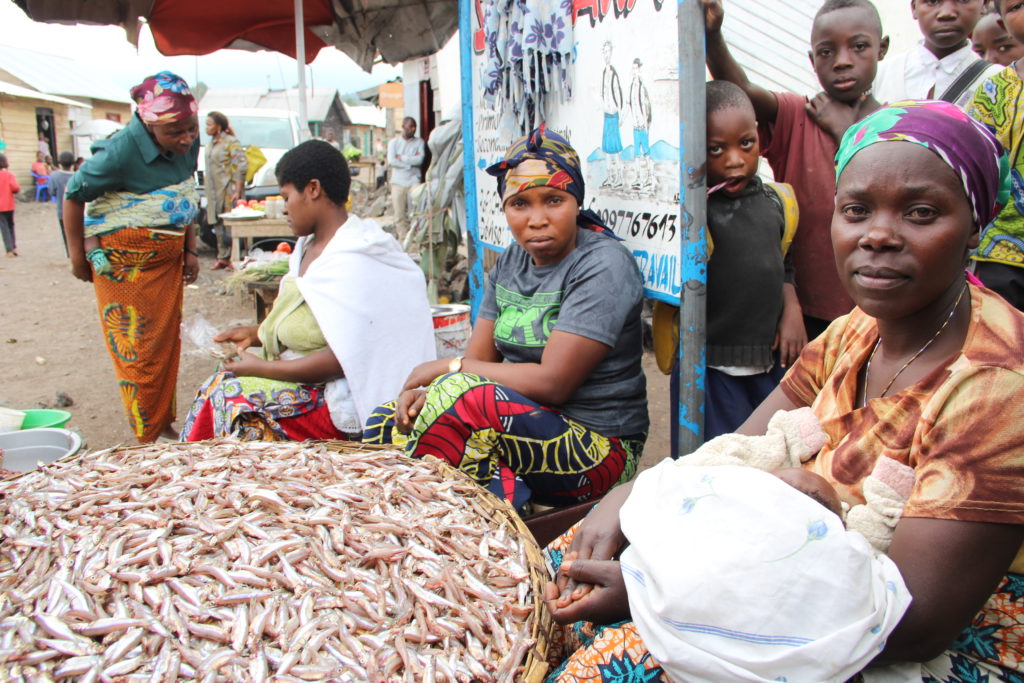
Somalia
During the Paris Peace Forum held last week (11-13 November), the International Organization for Migration Somalia (IOM/Somalia) presented the project “Leveraging the Strength of Women in Peace Building and Promoting Gender Sensitivity in the National Programme on Disengaged Combatants”. Funded by Peacebuilding Fund (PBF) and jointly implemented by IOM and UNSOM, the initiative provided rehabilitation support to 150 women formerly associated with Al-Shabaab and indirectly benefited over 1,000 community members. In promoting gender-responsive interventions, the initiative engaged women networks and women-led civil society organizations as means to support their socio-economic reintegration. The successful implementation of the project in 2019 led to the mobilization of additional resources from Germany and subsequent construction of two new female rehabilitation centres. OROLSI provided strategic and technical support throughout project formulation.
Ethiopia
On 19 November, the DDR Section met with the Resident Coordinator Office (RCO) in Ethiopia and the UN Office to the African Union (UNOAU) to exchange on UN support to weapons and ammunition management (WAM) in Ethiopia. The DDR Section has offered technical assistance to the RCO on DDR-WAM related policy matters.
On 16 December, DDRS participated in a meeting organized by the RCO in Ethiopia with UNMAS, UNOAU and the Office of the Special Envoy for the Horn of Africa on mine action support to Ethiopia. The Resident Coordinator used this as an opportunity to consolidate UN support on border security-related matters in Ethiopia.
Sierra Leone
On 15 November, the Deputy Secretary-General, Ms. Amina J. Mohammed, and the Vice-President of Sierra Leone, Dr. Mohamed Juldeh Jalloh, launched the Peacebuilding Fund (PBF)-funded project “Empowering Youth at risk as a Resource for Peace”. The PBF project was developed based on the findings and recommendations of the Joint UN-Government of Sierra Leone (GoSL) Technical Assessment on youth at risk, completed in October 2019. OROLSI/DDRS led the assessment and was responsible for design, revision and training on data collection tools, including perception surveys and data analysis. Moreover, DDRS provided technical support throughout internal consultations and the development of the PBF proposal.
Policy Updates
Partnership with the World Bank
In October and November, The DDRS held two sessions of a Virtual Dialogue series with the World Bank. The meetings were an opportunity to take stock of the UN-WB partnership at the global level as well as discuss current field engagements in DRC, CAR, and Mali. The meetings were also an opportunity to identify new areas for potential joint work, building on the recent policy shifts in both DPO (IDDRS and peace and security reform) and in the WB’s business model (Fragility, Conflict & Violence Strategy).
The two entities took stock of past and current engagements at HQ and field level. Experiences in DRC (MONUSCO), CAR (MINUSCA), and Mali (MINUSMA) demonstrated the successes of the UN-WB partnership on DDR in UN Peacekeeping Operations settings. Specifically, the broad division of labor, under the so-called tripartite approach, wherein the Missions undertake disarmament, demobilization and reinsertion efforts (including Community Violence Reduction), while the World Bank engages with national authorities on generating the conditions necessary for long term and sustainable reintegration – with both entities also providing strategic and technical assistance to national stakeholders – was highlighted as an approach to further foster. The meeting series also considered concrete proposals of new contexts, setting a forward-looking agenda on how the UN-Bank partnership can strengthen potential engagements in Africa, MENA, and elsewhere, including Special Political Missions (SPM) and non-mission settings.
Ex-combatant Opportunities in Extractive industries
In a meeting in October with the Extractives and Minerals Sector Unit, in the Directorate for Financial and Enterprise Affairs at the Organization for Economic Co-operation and Development (OECD), the DDRS received preliminary agreement to finance and conduct a joint project aimed at accumulating a body of knowledge on opportunities in support of reintegrating demobilized combatants in the extractive industries/artisanal mining sector. Despite the obvious links of armed group grievances and activities to the exploitation of natural resources in contexts such as the DRC, no DDR process to-date has looked into developing tailored approaches that explore and capitalize on economic opportunities in the extractive industries. This project will serve to produce the much-needed evidence base in this regard.
Call for applications: Terms of Reference Document
Mental Health and Psychosocial Support
Ex-combatants’ and associated groups’ long-term exposure to armed conflict and violence, separation from their families and communities, low standards of living, and possible social exclusion and community stigma directly affects their mental health. Ex-combatants may still experience psychological stress or develop mental health and substance abuse conditions long after demobilization and reintegration. Given the importance of mental wellbeing in the success of DDR, as well as shifts in the mental health field towards a holistic mental health approach, the DDR Section has redoubled its efforts to better understand the mental health and psychosocial support-related elements in DDR and improve mental health outcomes and wellbeing in ex-combatants and the communities into which they reintegrate.
As part of these efforts, the DDRS has been in close collaboration with the World Health Organization (WHO). In November, the DDRS met the Mental Health in Emergencies Unit of WHO to discuss the issues of mental health and psychosocial support in DDR settings. These include bolstering mental health and psychosocial support to ex-combatants dealing with trauma and other war related disorders as well as exploring ways of deploying mental health interventions in support of reintegration and social cohesion between ex-combatants and receiving communities. These preliminary discussions centered on developing a set of activities related to this joint work, including identifying potential pilot settings where an operational approach can be undertaken.
Integration of Ex-Combatants in Armed Forces
The DDR Section met with the World Bank and OROLSI/SSR counterparts to discuss a new joint project on the DDR-SSR nexus. The project, to be funded by the WB, will identify good practices and define basic principles to guide the UN and WB’s operational, political and strategic support to national government’s effort towards the integration of ex-combatants into national security sectors, armed forces, and mixed units.
12th Annual Meeting of Senior DDR/CVR Officers
On 2 and 15 December, the DDR Section hosted the twelfth Annual Meeting of Senior DDR/CVR Officers virtually. Senior DDR officers of five peacekeeping operations and five special political missions attended, together with experts from the UN Transitions Project, as well as staff of ASG Zouev’s Front Office and the DDR Section.
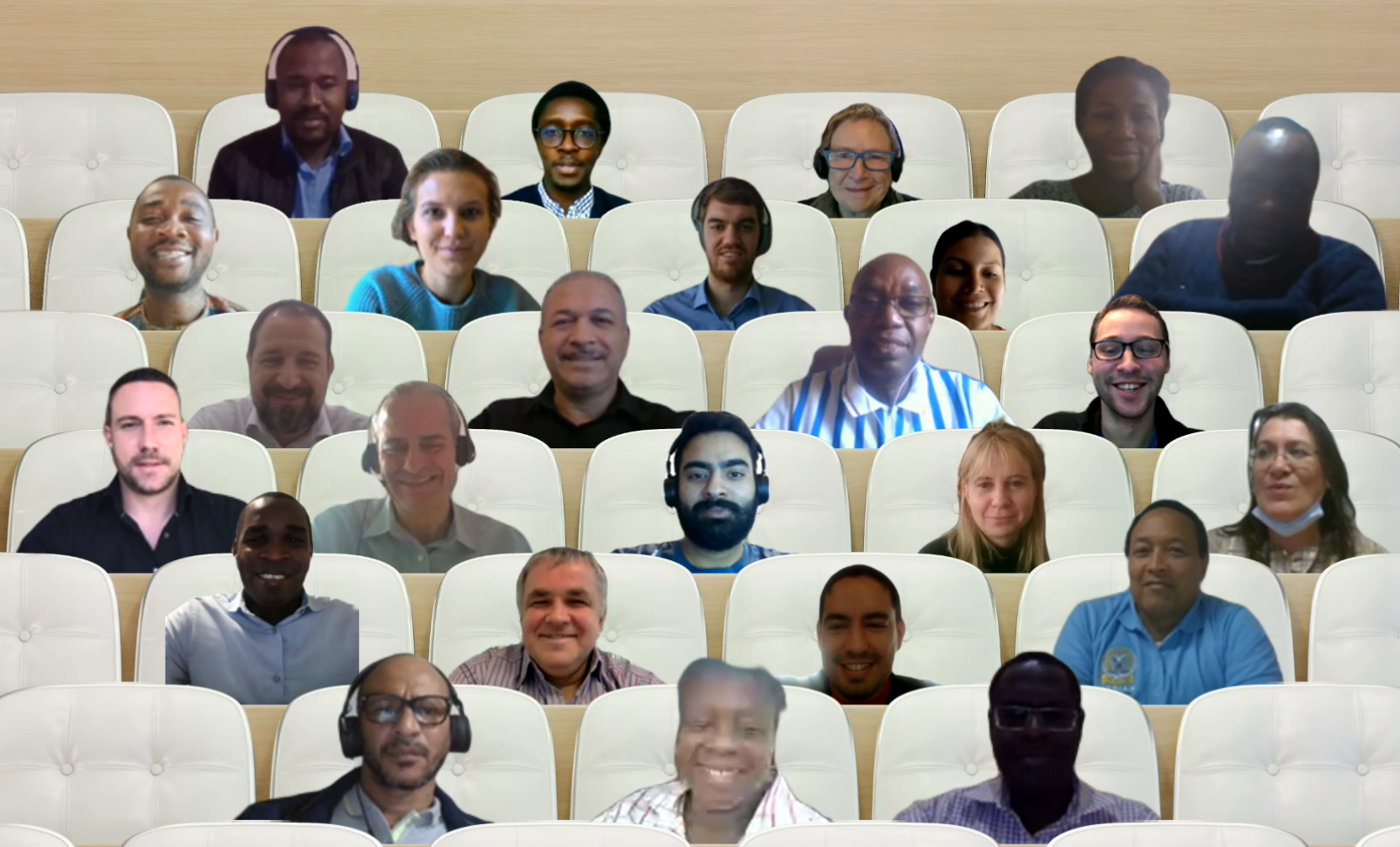
The first session of the event highlighted key aspects of developing a transition strategy for DDR field components. The second session was devoted to discussing implementing partnerships for DDR and the general principles and key conditions that are needed in shaping partnerships with them.
The main outputs based on the discussions and recommendations stemming from the session are the development of a paper on DDR and Transitions Planning Process to be issued in January 2021 and the creation of a compendium of good practices that will gather tools, legal templates, and training materials that DDR field components have employed to select, maintain, and monitor implementing partnerships on the ground. It is envisaged that a field-based community of practice can be established around this compendium, to foster further knowledge exchange between field practitioners.
Political Transformation of Armed Groups
In November, the DDRS and Folke Bernadotte Academy launched, within the framework of the operationalization of the IDDRS and its module on the Politics of DDR, a joint project on typologies of armed groups for the purposes of DDR. The project responds to the core rationale for the revision of the IDDRS – that the presence of increasingly fragmented and increasingly diversified armed groups in the majority of conflict contexts requires the departure from one-size-fits-all thinking and adaptation of DDR tools to individual needs of various groups. The project will consist of desk analysis of existing typology tools and, eventually, result in the development of a practitioner-friendly tool specifically addressing the needs of the DDR communities.
On 18 November, DDRS along with the Folke Bernadotte Academy and the Politics after War academic network co-launched a series of academic seminars entitled “From Armed to Non-Armed Politics: A series of Virtual Seminars Initiating a Research-Policy Dialogue on the Political Dynamics of DDR“. This series of academic seminars complemented a policy event for UN policymakers/practitioners at the December DDR Chiefs’ Meeting/Symposium on the transformation of armed groups to political parties.
Gender-Responsive DDR
In celebration of the 20th anniversary of the UN Security Council Resolution 1325 (2000) on Women, Peace and Security (WPS), the Department of Peace Operations – through the Office of Rule of Law and Security Institutions (OROLSI), the Gender Unit and the Strategic Communications Section – has compiled a series of good practices, lessons learned as well as stories from the field on promoting gender-responsive DDR processes. The initiative demonstrates DPO’s commitment towards promoting the WPS agenda and ensuring women’s full, equal and meaningful participation as a political and peacekeeping norm.
From former combatants to peacebuilders, women fulfill a wide set of roles in the effective implementation of DDR processes.
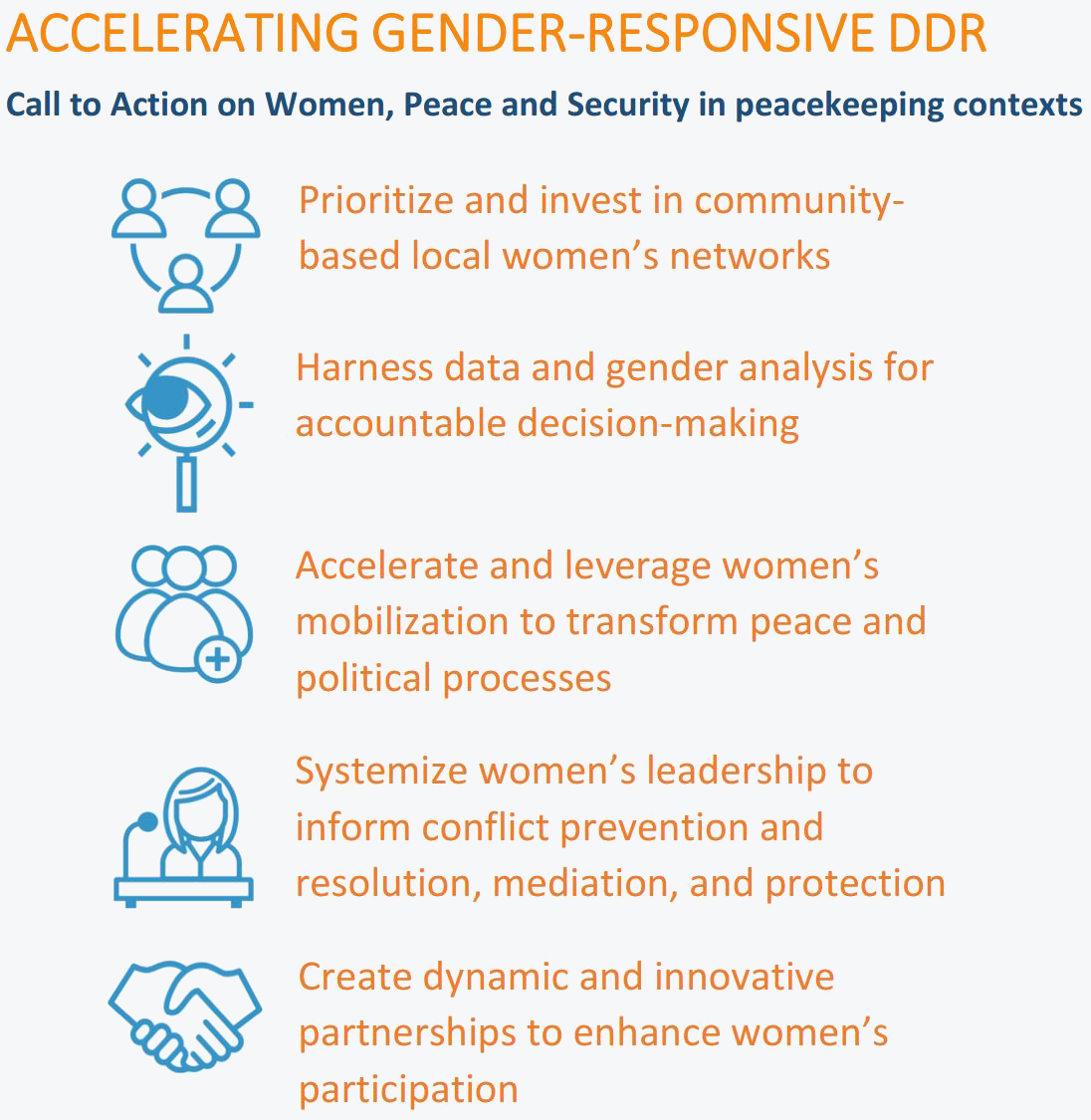
Promoting gender-responsive DDR through meaningful participation of women at all stages of DDR is essential for the success and sustainability of interventions. Across DDR processes, women combatants usually represent a small percentage of demobilized caseloads. Despite this limitation, the implementation of DDR-related tools, notably CVR projects, allows DDR components in peace operations to mobilize and empower women towards mitigating local conflict, preventing recruitment into armed groups and building community resilience, including its capacity to absorb ex-combatants.
This document is informed by field practice and highlights the increasing political emphasis, especially through UN Security Council mandated tasks, on ensuring gender mainstreaming in DDR processes as a key element for promoting peace and security. This includes addressing sexual violence, considering the different needs of women and girls, and ensuring protection of women from violence.
Weapons and Ammunition Management
Weapons and ammunition management (WAM) has become increasingly central to the work of UN peace operations, including as part of Disarmament, Demobilization and Reintegration (DDR) processes. To support comprehensive DDR efforts, the United Nations Department of Peace Operations (DPO) and the Office for Disarmament Affairs (ODA) are implementing a joint initiative on “Effective Weapons and Ammunition Management in a Changing DDR Context”.
Under this joint initiative, a new module on small arms and light weapons (SALW) control in the context of DDR (2.30) of the Modular Small-arms-control Implementation Compendium (MOSAIC) was released. The module is firmly based on the revised Integrated DDR Standards (IDDRS) module 4.10 Disarmament as well as the new sub-module 4.11 Transitional Weapons and Ammunition Management, thereby ensuring consistency in guidance on WAM and DDR across UN standards.
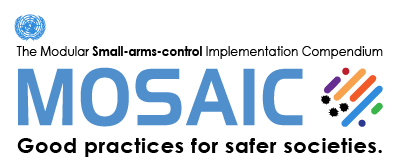
To ensure continuous dissemination of WAM resource material for DDR practitioners, an online Community of Practice – “WAM & DDR Hub” – was launched. The Hub brings together DDR practitioners and WAM experts to connect, network and share experiences, advice and guidance related to WAM in DDR contexts. Join this online community to get the latest on WAM!
In collaboration with the United Nations Institute for Training and Research (UNITAR) and the Ammunition Management Advisory Team (AMAT), the annual DPO-ODA training course on “Effective WAM in a Changing DDR Context” was successfully held from 2 November to 4 December 2020 (based on a practical handbook –available in English and French). In light of the COVID-19 pandemic, the training was conducted over the course of five weeks in a dynamic, participatory virtual format bringing together representatives from UN Peace Operations, including MINUSCA, MINUSMA, MONUSCO, UNAMID, UNMISS, and BINUH, other UN entities from non-mission settings, national authorities from Cameroon, Haiti, Mozambique, South Sudan and Sudan, as well as the African Union and training institutes, including the Folke Bernadotte Academy (FBA), the Kofi Annan International Peacekeeping Training Centre (KAIPTC) and the Bonn International Center for Conversion (BICC).
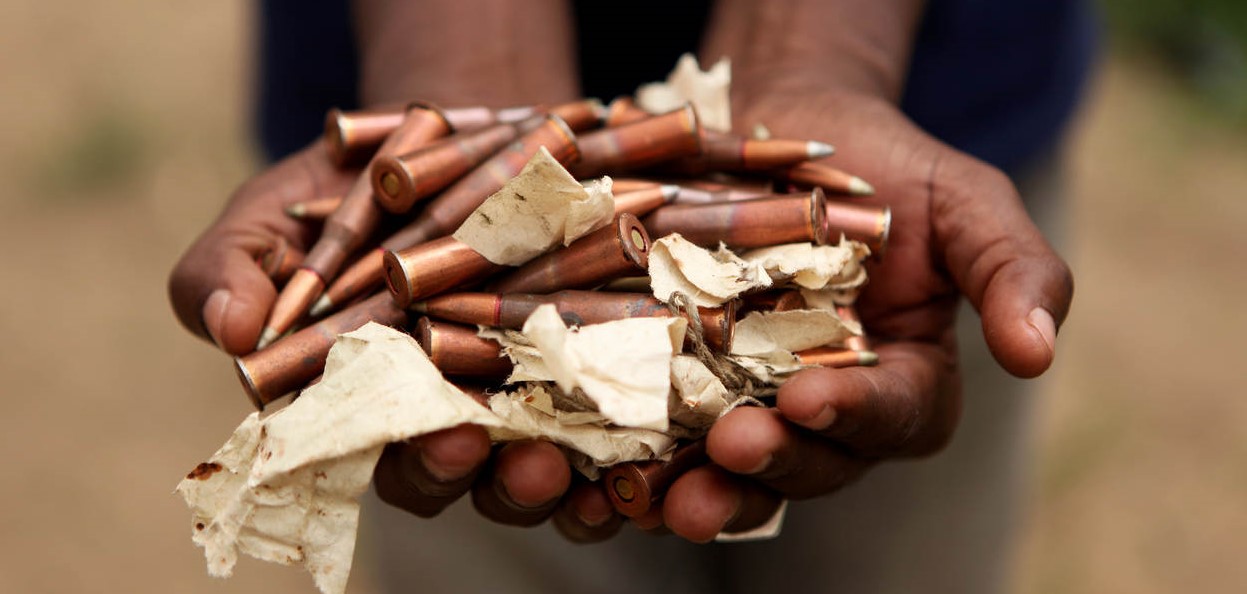
DPO and ODA continued to operationalize a technical assistance mechanism for WAM interventions in DDR processes, including through the provision of remote support to the newly established United Nations Integrated Transition Assistance Mission in Sudan (UNITAMS). In November 2020, a preliminary study on transitional WAM in Sudan, with a focus on Darfur, South Kordofan and Blue Nile, was finalized in collaboration with the United Nations Institute for Disarmament Research (UNIDIR), making concrete recommendations for UNITAMS engagement on WAM.
In addition and as follow-up to the technical assessment mission on WAM deployed to Haiti in 2019, DPO and ODA are collaborating with United Nations Integrated Office in Haiti (BINUH), the United Nations Development Programme (UNDP), the United Nations Regional Centre for Peace, Disarmament and Development in Latin America and the Caribbean (UNLIREC) and UNIDIR to support Haiti in the establishment of a comprehensive arms control framework.
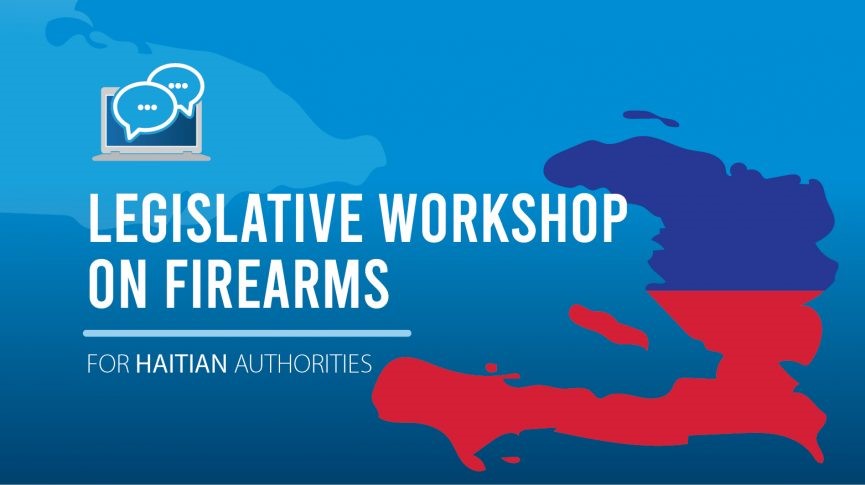
An online workshop for Haitian authorities was held to present the main findings and recommendations of UNLIREC’s legal study of the national arms control framework, as well as its legal dictum on the country’s bill on firearms. United Nations support to the Haitian authorities includes legislative assistance for the review of the bill of law on firearms and policy support in elaborating a National Action Plan aligned with the Caribbean Firearms Roadmap and based on a WAM baseline assessment and an arms and ammunition profiling study to be conducted in 2021.
The joint DPO-ODA initiative supported an EU-UN seminar on “Addressing illicit small arms in conflict affected areas: The role for peace support operations” held in December. This Ad Hoc Seminar was one of the key results of the 26th meeting of the UN-EU Steering Committee on Crisis Management held in Brussels in November 2019 which was attended by Under-Secretary-General Lacroix. Bringing together EU representatives and Member States, UN entities, as well as representatives from UN Peace Operations and various non-governmental expert organizations, discussions focused on the role of peace operations in information gathering, tracing and investigation, as well as in building national weapons and ammunition management capacity of host states and on the importance of safe and secure management policy and practices of peace operations’ own weapons and ammunition.
Stories From the Field
ADAPTING TO A PANDEMIC![]()
There is no way to conduct DDR/RR activities from home
![]()
Mass Katangira Walimba
Mass Walimba is a DDR/RR – CVR Officer at the K8 Lava Site in the Democratic Republic of Congo. Working with the MONUSCO team, Mass works in the DDR operations office and is in charge of contacts with state partners (Forces armées de la république démocratique du Congo (FARDC), Congolese National Police (PNC), Agence Nationale de Renseignements (ANR), Direction Générale de Migration (DGM)) on DDR / RR issues at national and provincial level and contacts with international partners (Rwanda Demobilization and Reintegration commission (RDRC). Mass is also the main negotiator with local and foreign armed groups and the Mission’s armed groups expert, providing practical advice not only to the DDR/RR Section, but also supporting the Child Protection Section (CPS) and the Stabilization Support Unit (SSU). Mass has worked tirelessly throughout the pandemic to mitigate disruptions and continue critical activities. The DDR Section interviewed Mass in January on the impact of the pandemic on his work.
What was the period of uncertainty like at the start of the pandemic?
 At the start of the pandemic with the death toll in China, Europe and the United States, I thought it was the end of the world. The most challenging time was when the first case was registered in Lava compound, our office area. As it was a doctor from our hospital, I became very stressed. If he could not protect himself from Covid, how all ordinary UN staff members would…
At the start of the pandemic with the death toll in China, Europe and the United States, I thought it was the end of the world. The most challenging time was when the first case was registered in Lava compound, our office area. As it was a doctor from our hospital, I became very stressed. If he could not protect himself from Covid, how all ordinary UN staff members would… 
How has this uncertainty affected your work?
There is no way to conduct DDR/RR activities from home. Unfortunately, e-mail and teleconferences are not enough for DDR/RR, it requires action. The main activity of the Section is sensitization of armed groups, which implies field missions and face-to-face interaction with combatants. It is also vital to meet partners. We could not continue implementation of these activities as we did before due to the pandemic. However, myself and the team make all necessary efforts to continue our activities.
What have been the most difficult aspects of practicing DDR during a pandemic?
We cannot do DDR from our home offices. To get the results it is necessary to carry out awareness-raising sessions for combatants of armed groups in the field, conduct face-to-face meeting with partners as well as go to the field to extract combatants, who decided to disarm. As the majority of these activities were blocked during the pandemic, I had to accept that we cannot work as before. Nevertheless, I concentrated on opportunities we had and assisted with the missions approved by the heads of offices taking into consideration all Covid-19 prevention measures.
How were you able to overcome these challenges?
To overcome these challenges together with the team we started brainstorming on other ways of sensitizing combatants. We increased the number of radio programmes broadcast in the field and put an emphasis on the Section’s hotline to maintain the contact with armed elements. With the above efforts, we managed to extract some former armed elements and host them in our transit center, which has been rearranged as per Covid-19 prevention measures. Moreover, we conducted repatriation of two groups of former armed elements to Rwanda.
What lessons did you learn from the pandemic that you will use in the future?
I knew that communication is a key to successful DDR/RR operations. Yet, I believe that our communication skills have significantly improved during Covid as we had to stand together in order to have an opportunity to continue our operations. Moreover, I learned that health should be always a priority for DDR/RR, as we never know what kind of health background our clients have and we should be ready to assist.
How do you think the larger DDR landscape has changed or will change in the wake of the pandemic?
During the pandemic the government understood that transferring ex-combatants from the East of the country to the West is quite dangerous. Thus, the current approach is to assist combatants in their community areas, which I find very positive. However, I believe more changes will come as the pandemic is far from getting to an end.
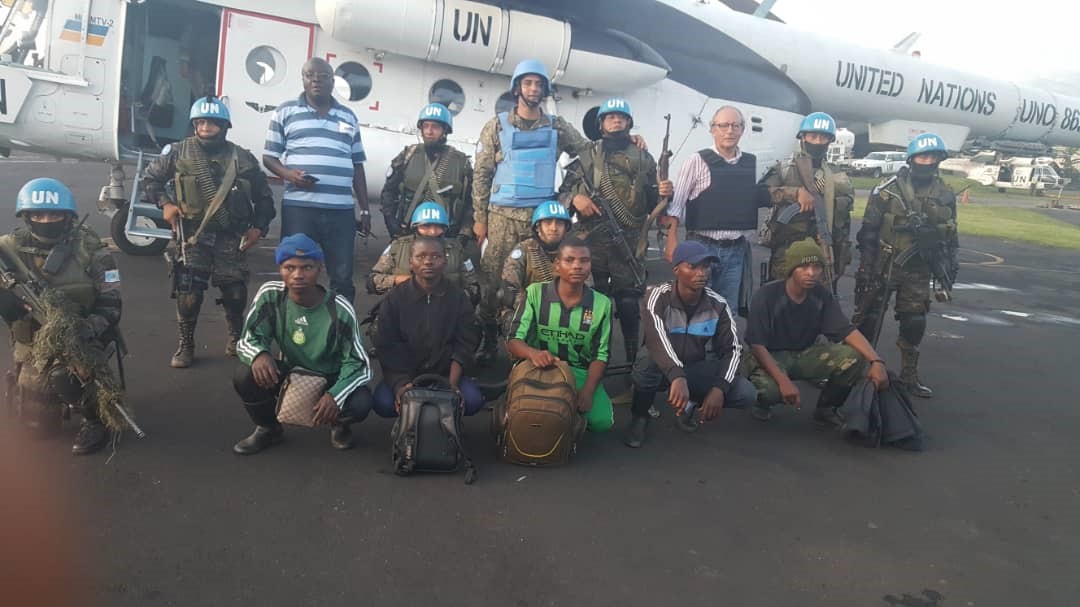
MONUSCO
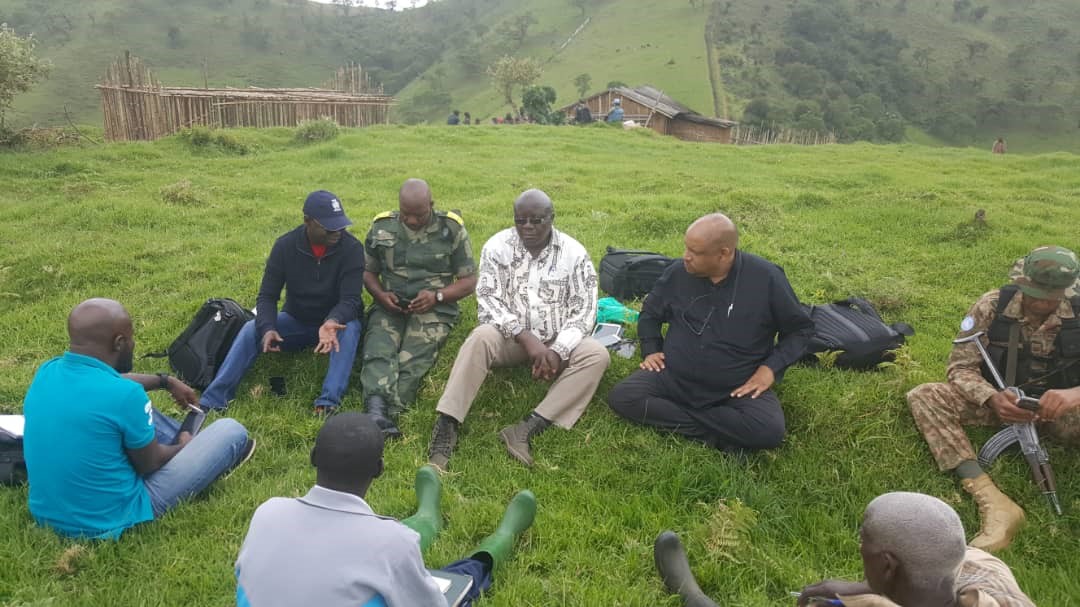
MONUSCO

We had to stand together in order to have an opportunity to continue our operations

IDDRS UPDATES
On 28 September and 1 October, the Inter-Agency Working Group (IAWG) on DDR held a workshop series to advance the development of the IDDRS module on armed groups designated as terrorist organizations (AGDTO). The events allowed the exchange of experiences and institutional views regarding the political, operational and programmatic challenges in designing, implementing and supporting DDR processes in contexts where AGDTO operate. Following consultations, the draft module initiated the formal IAWG validation procedure.
On 20 October, the IAWG-DDR held a webinar focused on DDR and Organized Crime. The meeting served to present the main aspects of the draft guidance and ensure broad consultation among IAWG entities. The draft module was developed by the Global Initiative Against Organized Crime (GI-TOC) in collaboration with the Bonn International Center for Conversion (BICC). The document was submitted on 23 December 2020 for formal validation among IAWG entities.
In the framework of the revision of both the Secretary-General’s Guidance Note on Transitional Justice and the Integrated DDR Standards module 6.40 on DDR and Transitional Justice, discussions are being conducted with DDR and Human Rights field officers on DDR and transitional justice in MINUSCA, MINUSMA and MONUSCO. OHCHR is leading these revision processes in close coordination with the DDR Section and it is expected that both the Guidance Note and the module will be ready by the end of 2020.
On 16 December, DDRS hosted a webinar on the IDDRS module on Disability inclusion in DDR. This module, which will be a new addition to the IDDRS, will focus on providing DDR practitioners with guidance on disability inclusion in assembly and cantonment situations in DDR, including access to information, disability-specific assistance, physical layout of reception centers, and health system requirements to accommodate specific needs of ex-combatants with disabilities. Beyond traditional DDR programmes, the module also covers planning and preparation in receiving communities, resettlement of ex-combatants, and supporting self-demobilized ex-combatants leaving armed groups due to physical injuries. Lastly, the module will include concrete analysis tools, including a situational analysis and an inclusion marker for DDR.
IDDRS Modules Status
modulex.xx
In Progress
modulex.xx
To Be Validated
modulex.xx
Completed
level 1
General IDDRS
module1.10
Introduction to the IDDRS
module1.10
Glossary: Terms and Definitions
level 2
Concepts, Policy and Strategy of the IDDRS
module2.10
The UN Approach to DDR
module2.11
The Legal Framework for UN DDR
module2.20
The Politics of DDR
module2.30
Community Violence Reduction
module2.40
Reintegration as Part of Sustaining Peace
level 3
Structures and Processes
module3.10
Integrated DDR Planning: Processes and Structures
module3.11
Integrated Assessments
module3.20
DDR Programme Design
module3.21
Participants, Beneficiaries, and Partners
module3.30
National Institutions for DDR
module3.40
Mission and Programme Support for DDR
module3.41
Finance and Budgeting
module3.42
Personnel and Staffing
module3.50
Monitoring and Evaluation
level 4
Operations, Programmes and Support
module4.10
Disarmament
module4.11
Transitional Weapons and Ammunition Management
module4.20
Demobilization
module4.30
Reintegration
module4.40
UN Military Roles and Responsibilities
module4.50
UN Police Roles and Responsibilities
module4.60
Public Information and Strategic Communication in Support of DDR
level 5
Cross-cutting Issues
module5.10
Women, Gender and DDR
module5.20
Children and DDR
module5.30
Youth and DDR
module5.40
Cross-border Population Movements
module5.50
Food Assistance in DDR
module5.60
HIV/AIDS and DDR
module5.70
Health and DDR
module5.80
Disabilities and DDR
level 6
Linkages
module6.10
DDR and SSR
module6.20
DDR and Transitional Justice
module6.30
DDR and Natural Resources
module6.40
DDR and Organized Crime
module6.50
DDR and Violent Extremism as and when conducive to terrorism
